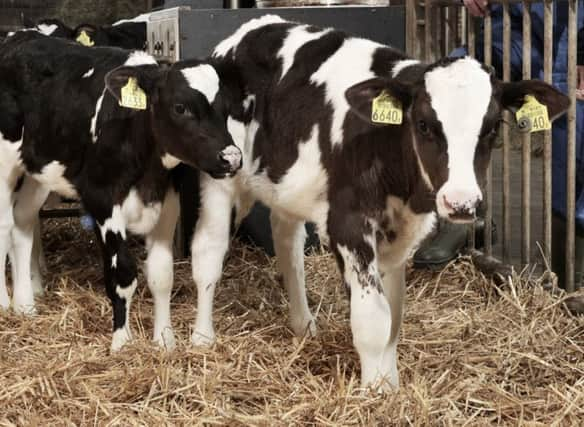Tips to help reduce the risk of calf pneumonia


Calves with pneumonia may cough, have a discharge from the nose, be off their feed, have an increased breathing rate/pant and a high temperature. A case of calf pneumonia is costly to treat and can spread throughout the group. As studies have shown that cows that had pneumonia as calves produce less milk compared to those who never had pneumonia therefore, prevention of pneumonia is better than cure.
Infectious agents, such as bacteria and viruses, cause many of the cases of calf pneumonia. However, many factors increase the risk of pneumonia, such as housing and mixing of cattle, poor ventilation, changes in weather and stress. For example, if there are too many calves in a shed (high stocking rate) this means many cattle are breathing the same air and infections can easily build-up and spread. In addition, if the weather is very still, then the cattle house could become very stuffy, increasing the risk of calves getting pneumonia. It is important to avoid drafty conditions in the house (damp wind blowing straight on cattle) while trying to keep the air fresh by ensuring air movement above cattle’s heads.
Advertisement
Hide AdAdvertisement
Hide AdVaccination will increase calves immunity to disease and your vet will advise you of the best vaccination for your farm management system. Good nutrition can also aid in supporting calves’ immune function, in particular, ensuring calves receive four litres of clean, good quality colostrum as soon as possible after birth. Do not worry if they do not seem as hungry at the next feed time, they will have received ‘what they need, when they need it’.
In addition, research has shown that feeding a higher plane of nutrition (900g of calf milk replacer mixed to six to seven litres) before weaning can improve immune development and health of calves – both before and after weaning. It is important to use a good quality, highly digestible calf milk replacer, as a poorer quality calf milk replacer can cause a nutritional scour at these levels.
A good quality calf milk replacer will also supply essential nutrients (such as amino acids, minerals and vitamins) to support growth and the immune system. Calf milk replacers that have the LifeStart logo are formulated to high scientific standards, have essential nutrients included and are proven suitable for feeding at higher levels.
In addition, calf milk replacers have the option of having Pulmo+ included, a natural complementary feed designed for the nutritional maintenance of a healthy respiratory tract. Pulmo+ contains the essential oil, Cineol, which helps to clear airways by loosening the mucus and facilitating the natural clearing mechanism of the lungs, thereby maintaining a healthy respiratory tract.
Advertisement
Hide AdAdvertisement
Hide AdIn summary, feeding four litres of colostrum and a higher plane of nutrition of a good LifeStart-quality calf milk replacer will help maintain a healthy immune system. In addition, Pulmo+ facilitates the natural clearing mechanism of the lungs, thereby maintaining a healthy respiratory tract.